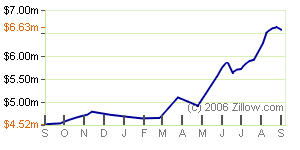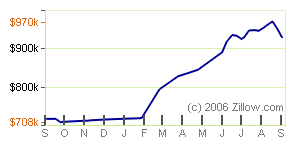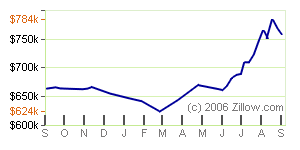...are not videotapes and airline tickets.
(note: this is a repost of this blog's 9/2/06 entry
Sellsius Zillow Poll Results. Feedback was that the point needed to stand alone. md)
Zillow. Brilliant marketing concept, for sure. We're all running around saying, yelling, screaming the "Z" word, while the founders go to every realtor trade association meeting they can get a plane ticket to (on-line tickets, through Expedia.com, of course) and sit up on the dais, with Cheshire cat grins, talking about how they created the fabulous Expedia.com and how it changed the travel agency business forever (read: put thousands of travel agents out of business).
Their posture is uncannily similar to that of a group of men I met back in 1992 when they bought a little-known company called Boston Chicken. I was Director of Operations for Boston Chicken at the time, a concept of fresh food served in a charcuterie style to raging fans in the Boston area. The concept was founded by Kip Kolow and Arthur Cores, two "nice boys" from Newtonville, Mass. about 10 years earlier. The foundation of the concept was the fresh and delicious food, prepared with the finest, freshest ingredients, delivered daily to our stores.
This group was still riding high on their success with the Blockbuster Video chain. They had become early franchisees of Blockbuster and grew at a faster pace than the franchisor, eventually taking the founders over and making lots of money in the process. They figured they had the Midas touch (and so did their backers) and could do the same thing with Boston Chicken that they did with Blockbuster - grow it fast and reap the rewards.
In order to do this, they developed plans to buy the entire crop of butternut squash grown in the midwest, put the fresh product into leased freezers, have it processed, and have it sent frozen to the stores by a distributor. They planned similar mass buys, storage and delivery schemes with potatoes (if you ever had the mashed potatoes from one of the original Boston Chickens, you understand what a blasphemous act this would have been). The same plan existed for all fruits and vegetables, and even - brace yourself - chickens! After all, they needed to buy in bulk and get the product cost down in order to be more profitable for their company stores and to attract new franchisees. Gee whiz, when the video rental business slowed down, they could even put Boston Chicken stores in the Blockbuster locations and train the franchisees how to operate them. How brilliant!!! How enterprising!!!
These guys did know the video business and they sure knew how to create sizzle (use of "z" merely necessary, not intentional), but they didn't understand the food business. I remember talking with one of the head honchos in our offices overlooking the Harvard football stadium the day after they bought the company. He asked me what I thought the growth potential was of the company, and I told him what we had found in our concept development research: "probably 250-300 stores in upscale shopping centers and commercial districts around the country, owned and operated by franchisees who are committed to quality, freshness and service". These were the hallmarks of the Boston Chicken brand that Arthur and Kip had worked for years to create and we worked diligently to preserve, staying true to the concept even as we grew to 45 stores throughout the northeast.
He told me that I "wasn't thinking big enough". He put his foot up on the arm of my chair and, while scratching his nether-regions, told me they would become the "McDonalds of chicken!". He went on raving about how he and his "boys" (completely different meaning from the earlier use of the term) had built up "fifteen hun'red Blockbuster stores" and had changed the world forever. "Your success with the Blockbuster concept has been phenomenal," I said. "I think it's important, however, to keep in mind that people have a different standard for what they put in their mouths and feed to their families than the standard they have for what they put in their VCRs".
Well, the rest is history. The Boston Chicken name was changed to Boston Market, the group sizzled through a much-heralded public offering, the stock sky-rocketed, the stock plummeted, then they went bankrupt. A March 13, 2002 article in the WSJ drew a comparison between Boston Market and Enron.
I knew I recognized the cockiness I saw in the Zillow founders when I attended a presentation of theirs hosted by Brad Inman in New York this past February. It somewhat irked me and made the hair on the back of my neck stand at attention. I think I've figured out why.
They (and their backers) figure they have the Midas touch, too. They figure they can do the same thing with homes that they did with airline tickets - grow the business fast and reap the rewards.
In order to do this, they are developing a website that they claim will empower the consumer to make buying and selling decisions for homes on their own. They take raw numbers from the municipal records of villages, towns, and cities that they know nothing about and probably have never visited, and, using their own witchcraft formula, assign values to our homes that they arrogantly expect us to believe to be accurate and on which we will base million-dollar decisions.
Currently, the information Zillow provides is grossly inaccurate in many markets. Here in the Hamptons, their Zestimates differ from my professional valuations between 30%-100% on many properties (you read it correctly - up to 100% off-base). I have seen Zillow value a property at $4 million that has comps to support a value of over $8 million. The sad thing is that there are buyers and sellers making decisions based upon this information (see
Seller Gets "Zillowed" ). I can see it now: con artists knocking on elderly folks' doors, using Zillow Zestimates to convince them to sell their homes for much less than they're really worth.
It will take a number of lawsuits or perhaps even a class action suit against Zillow before they put the appropriate disclaimers on their site. Fact is,
NO ONE should be making a buy or sell decision based solely on Zillow information. Professional advice is highly recommended.
If asked, what I would say to them would be: "Your success with the Expedia.com concept has been phenomenal. I think it's important, however, to keep in mind that people have a different standard for making what will most likely be the largest purchase in their lives - their home - than the one they have for buying an airline ticket."
My prediction is that, despite the current sizzle that has been created, Zillow will be a Zubble, a Zlip in Zistory. Unless, of course, they figure out how to provide accurate information and take responsibility for advising people how to use it in proper context, at which point it just might become a useful tool to consumers and brokers alike.
Brace yourself again: the rest will be history. md




 Greg Swann is a broker, Realtor, philosopher, businessman and blogger. He has a crisp and refreshing perspective about real estate that captures what I love about this business. This post, below, puts how I wish to conduct myself into words. Thanks for the inspiration, Greg. md
Greg Swann is a broker, Realtor, philosopher, businessman and blogger. He has a crisp and refreshing perspective about real estate that captures what I love about this business. This post, below, puts how I wish to conduct myself into words. Thanks for the inspiration, Greg. md


 During his 20-minute discussion he stated that, while there were certainly pockets of distress and some markets that were feeling the strain of over-enthusiastic condo development, there were NOT signs that this current market would result in anything similar to the 1989-92 market decline.
During his 20-minute discussion he stated that, while there were certainly pockets of distress and some markets that were feeling the strain of over-enthusiastic condo development, there were NOT signs that this current market would result in anything similar to the 1989-92 market decline.









